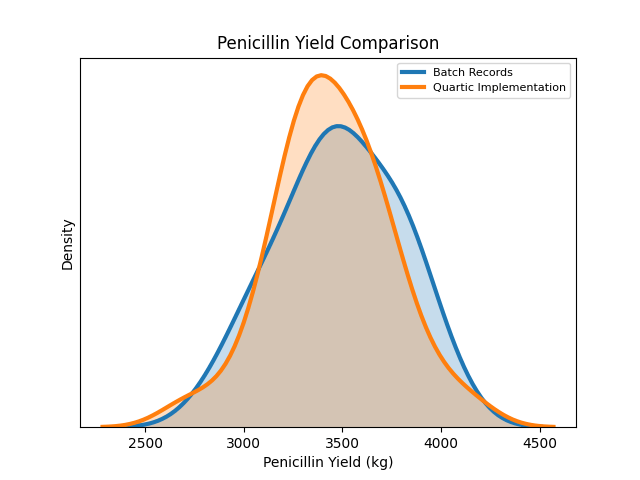
Penicillin Yield Comparison
More than 50% of biologic drug substances are made using mAb processes. The technology we are developing with Quartic.ai will allow existing mAb production to be more efficient, as well as provide a foundation to build highly intensified continuous mAb manufacturing facilities.
SAN JOSE, Calif. (PRWEB)
July 20, 2021
Quartic.ai today announced that it has developed a highly compute efficient digital twin of a penicillin bioreactor that simulates the industrial-grade Penicillium chrysogenum fermentation. The simulation is 40 times faster than traditional models or other available solutions—this allows for large amounts of compute-efficient data to be generated. Quartic is using the data to build and test reinforcement learning to improve the penicillin yield. The digital twin, which the company has open-sourced, is one of several Quartic initiatives aimed at accelerating the pharmaceutical industry’s transition from batch processing to continuous manufacturing of biologics.
“Today, more than 90% of biomanufacturing uses batch processing which is costly, slow, and asset intensive,” said Rajiv Anand, CEO and founder of Quartic. “The transition to continuous processing will be one of the biggest transformations in the industry and will enable the development of new therapies at speed and lower capital costs. Our goal is to provide the necessary building blocks so manufacturers can begin to reap benefits by starting the transition now.”
For biomanufacturers, the key challenge to the adoption of machine learning and autonomous control applications—which are the foundation of continuous processing—has been the need for large volumes of high-quality data. To accelerate the deployment of advanced control algorithms, manufacturers must rely on model-generated simulation data. However, it is often difficult to create high-fidelity simulations of bioprocesses that can reliably and affordably generate large quantities of high-quality data.
“AI promises to be a boon to continuous manufacturing and more immediately to process intensification in biomanufacturing. However, using AI today requires a hybrid modeling approach based on first-principle mechanisms and data-efficient models,” said Xiaozhou Wang, chief data scientist and cofounder at Quartic. “This has been a key focus at Quartic and has led to a number of practical breakthroughs. We believe our open-sourced model will help other researchers in biomanufacturing data science to speed up their experiments by generating large amounts of useful data.”
In another initiative, Quartic is working in collaboration with the University of Alberta to develop an end to end continuous manufacturing system using hybrid modeling for monoclonal antibody (mAb) production.
“More than 50% of biologic drug substances are made using mAb processes,” said Dr. Jinfeng Liu, a professor in the Chemical and Materials Engineering department at the University of Alberta. “The technology we are developing with Quartic.ai will allow existing mAb production to be more efficient, as well as provide a foundation to build highly intensified continuous mAb manufacturing facilities.”
Quartic is working with a number of pharmaceutical and life sciences enterprises to optimize their output and quality. To learn more or to participate in Quartic’s continuous biomanufacturing initiative contact the company at info@Quartic.ai
About Quartic.ai
Quartic.ai is a technology company based in Toronto, Ontario, and San Jose, California with a development center in Bengaluru, India. Quartic.ai provides AI enabled solutions for industrial digitalization. Its flagship product, the Quartic Platform accelerates the adoption of Industry 4.0 for process manufacturing practitioners to develop and deploy their own AI and IIoT-based solutions. The Quartic Platform was recognized with the 2019 Pharma Innovation Award for Pharma 4.0. For more information, contact Quartic.ai at 1-866-QUARTIC or visit http://www.Quartic.ai.
Share article on social media or email:

